After returning from fieldwork and the joint writing retreat in Ghana in early 2020, just before the outbreak of COVID-19, the PEPP research team began work on the final articles, participated in conferences, arranged workshops and began preparations for the closing events to be held at the end of 2021 in connection with the completion of the project.
Like almost everyone around the world being affected by the outbreak of COVID-19, PEPP members have also been disrupted in their work on the PEPP project. Travel restrictions made and continue to make collaboration between researchers and stakeholders in Denmark, Ghana, and other parts of the world difficult. Academic excursions, such as physically participating in the SMB2020 conference in Hamburg, had to be rescheduled. However, the PEPP team have attempted to overcome such challenges by continuing our close working relationship. Fortunately, given the geographical distance between researchers working on the project, PEPP have long been accustomed to using digital solutions such as video communication to support our scholarly partnerships. Furthermore, the COVID-19 event has also served to showcase how a global emergency affects shipping, port operation and the maritime sector, and the PEPP team has been hard at work collecting research material on this matter and implement the findings into the overall research project.
Despite temporary disruptions to the workflow caused by Corona, work on the PEPP project has continued unabated. All PEPP members have done their part in helping to realize the remaining objectives as the project is currently operating on its final year of 2021. Members have attended events such as the Africa Knows! conference, presenting two papers, an online panel organized by the Centre for African Studies at Jaharwalal Nehru University, New Delhi, the NorDev conference of 2021, and speaking at the International Conference Asia & Africa in Transition at the University of Copenhagen. Articles are also starting to be accepted and published such as Jonas Aryee's article in the World Customs Journal. Smaller writing retreats have also been arranged in Denmark, and a workshop for truckers of the Tema MPS terminal have been coordinated by George Ascheampong.
With PEPP research formally wrapping up by the end of 2021, preperations are being made for final completion events in Denmark and Ghana. Here the PEPP team will gather with relevant stakeholders to share findings from the project and look back on three years of academic work and partnerships. Recently, the PEPP team have submitted an extension for the project to the Danida Fellowship Centre. Looking forward, PEPP II will build on the findings from PEPP I and contribute new knowledge about the role of cluster performance, communication, and sustainability in Tema Port in its global context of public, private, national, bilateral, and multilateral relations.
From February 17 to March 16, the PEPP team went on their second field trip in Ghana, where Danes met their Ghanaian colleagues, held interviews, attended meetings, visited key sites of Tema port and arranged a joint writing retreat to finish up another highly succesful trip.
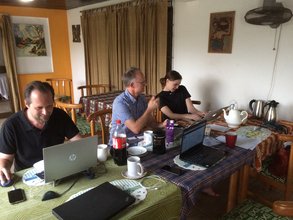
The PEPP project moved to Ghana for the intensive field trip, deciding to stay at Grace Court, Tema from the 17th so to be close to the port and arrange interviews with the key stakeholders. Thank you to the staff at Grace Court for providing us with the facilities and solid meals that facilitated a productive working environemtn. During the first part of the trip at Grace Court, PEPP had contact with with several key stakeholder, arranging interviews with representatives of shipping companies, stevedoring companies, GPHA officials and tugboat masters among others. We also visited key sites relevant to the port of Tema.
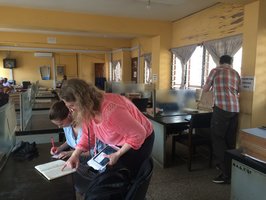
During the trip, PEPP visited the Public Records and Archives Administrations Department (PRAAD) in Accra. The visit has been a major development in the project research. The team had over the span of several days been searching for references to the history of Tema port and shipping in Ghana. More specifically, PEPP has focused closely on files relating to the Black Star Shipping line for an upcoming article. We are deeply grateful for the assistance by the staff at PRAAD, helping us locate the relevant materials.
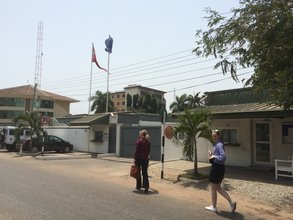
During the first part of the trip, PEPP continued the very fruitful conversations and interviews with key stakeholders related to Tema Port, establishing connections and leads to follow up on at later dates. Of much interest to PEPP have been the Berthing Meetings organized three times a week on Mondays, Wednesdays and Fridays, which PEPP have attended regularly since the start of the project. Finally, PEPP had a debriefing at the Danish embassy in Accra, updating them on our progress this past year and sharing some of our tentative findings with the Danish ambassador that can benefit the continued good cooperation between Ghana and Denmark. One of the major objectives of PEPP is to enhance communication at the port by sharing new understandings of different stakeholder positions with all involved. This is ongoing as we meet with key actors throughout the port environment and share the insights from stakeholders we have, previously, met.
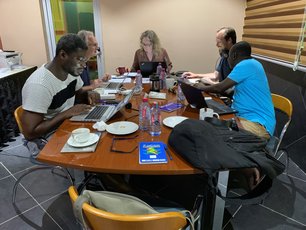
On March 1, PEPP left the base at Grace Court, Tema to head our to Akosombo for the planned writing retreat. Here we devoted much needed time to organize our findings, clean up data, and write up articles to conclude an exceptionally successful field trip. As the trip drew to an close, the Danish members returned back home to Denmark, and we plan to meet again during the spring/summer of 2020 for conference attendances and more collaborative work. Thank you again to everyone who helped make our field trip a productive, rewarding and worthwile experience!
The Ghana Maritime Authority (GMA) and their Danish counterparts extended their strategic sector cooperation agreement earlier this year to continue building the capacity of Ghanaian maritime professionals. See link to Danish Maritime Authority.
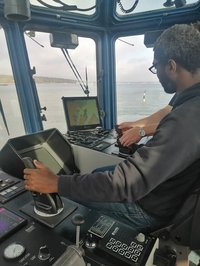
In late September and early October the Danish Maritime Authority (DMA) received three GPHA tugboat masters, Alex Baidoo, Anarfi Hammond and Ebenezer Quayson to Denmark for a two week training meant to improve their skills; also in readiness for bigger ships expected for the Terminal 3. Annette Hansen and Jonas Aryee had the opportunity to observe and partake in the training as part of the PEPP project. It has been two weeks of experience sharing, experimentation and finding best practices for efficient operations and maintenance of facilities.
After debriefing at the DMA on arrival, the training began in earnest the next day. The tug-masters were taken through theory maneuvering and simulation sessions at FORCE Technology outside of Copenhagen. Later in the week, they underwent safety at sea and first aid training at RelyOnNutec-Safety 360 degrees safety center, Esbjerg. They also had hands on training at on the ASD tugs of the Port of Aarhus doing practicing various maneuvers.

Later at midnight, we were invited back to the tug to witness the berthing operation of one of the biggest vessels in the world: Milan Maersk. The two-year-old 2nd generation triple E class container vessel has a capacity of 19630 TEU, length of 399 meters, beam of 58.6 meters. Towering 73 meters it was a big brick of blue wall viewing from the tugboat. Coming in at 12 meters draught the two harbour tugs gently brought her to rest at berth around 2am. Unfortunately, it was midnight so we couldn’t get good pictures. Also the length of the ship made it impossible to get the ship in the pictures due to proximity. A huge blue hull was all we could see from the tug as the ship towered 73 meters above.
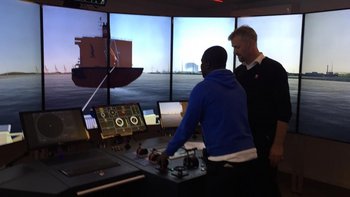
The next couple of days were dedicated to training on the in-house simulator at DanPilot, the Danish State Pilotage company where the tug-masters were practicing more maneuvers and communication techniques. It was immediately evident how quickly they are able to implement and assimilate new things learnt. It is also worth noting that some pilots of GPHA have already been trained in Denmark as well and had already started sharing their knowledge with their colleague, the tug mate. This made it easy and hopefully the efficiency of the marine section of the Port of Tema will improve as more people are trained.
On the 1st to the 5th of July, 2019 the PEPP research team gathered at Sandbjerg estate in Southern Denmark for an intensive 5-day writing retreat in order to discuss and write out the first drafts of the articles based on data collected in Ghana in April, 2019. Link to Sandbjerg website.
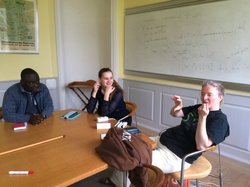
The retreat at Sandbjerg were programmed as a week of nonstop writing with limited wifi, a set schedule on minimum pages per day per person, as well as exercise in free writing for fifteen minutes every morning as a way to start the day and get the creative juices flowing. The writing retreat also provided ample opportunity for feedback on writing. In total the team managed to flesh out a combined total of 42.601 words spanning across the different article drafts. We are therefor well on track for the planned submissions of articles later this year and next year.
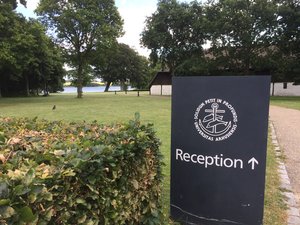
As the team were gathered together at Sandbjerg we were able to make detailed plans for the next steps of the project. The PEPP-team have agreed on two article submissions for November, one by Jonas Aryee and Casper Andersen about digital transformation and another by George Ascheampong on port changes and efficiency for the Journal of African Business. Arrangements have also been made for the coming meetings held over zoom.us in the autumn and winter. And most importantly, a schedule has been set for the next fieldtrip to Ghana in February and March of 2020. As of now, we are in the process of making fieldwork preparations involving drafting interview and survey questions, following up on previous data collections, as well as making a strategy for gathering new data in Ghana for articles to be submitted in 2020. Preparations has also been made for another writing week in Ghana which will be held in the Aburi Gardens, as well as planning the next stakeholder meeting.
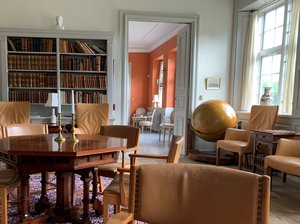
The Sandbjerg estate provided an excellent atmosphere for the writing spirit. Between writing there was also time for leisurely walk-and-talks in Sottrup forest and the surrounding countryside. The nourishing meals provided by the Sandbjerg kitchen gave fuel to the brain. A hearty breakfast kickstarted every day, and the hot lunch and dinner times were a welcome respite for gathering thoughts. The food was centered around traditional Danish cuisine, some of it locally sourced, and coffee and tea interspersed with desserts, cookies and fresh fruit were available at all times. The staff made arrangements to cater to our dietary preferences, and we extend our biggest gratitude to them.
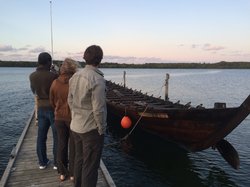
Between the writing there was also time for some maritime related sightseeing. One evening was spent in Sønderborg, the nearest town, where we took a looks at the boats anchored and tied up in the marina as well as taking a stroll down the main street. On another evening we got the opportunity to get a tour of the “Nydam Tveir”, a reconstruction of an 4th century oak warboat from the Danish Iron Age. Our gratitude to the caretakers for an interesting presentation on Iron Age maritime technology.
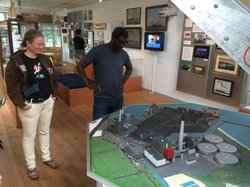
On the last day on our way back to Aarhus we made a short detour to visit the nearby museum of Aabenraa, which hosts a collection of items related to the town’s maritime history, including ship portraits, ship models and souvenirs that the Danish sailors brought back from their travels to Africa, South America, Asia and the Pacific. Our gratitude to the museum staff for letting us take a look at their interesting exhibitions, not least the display showcasing the development of the port of Aabenraa.
The PEPP research team went on a research trip to Ghana on the 29th of March to the 12th of April, 2019. The following is a description of the major events and outcomes of the trip:
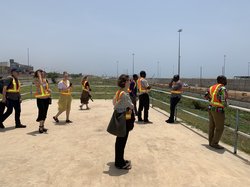
The funders represented by Mike Speirs from the Danish Foreign Ministry, Pernille Friis and Ida Arendal Jørgensen from Danida Fellowship Centre, and Erik Skov Madsen from FFU visited PEPP. The program included a presentation of the project at RMU, where both the visitors and RMU deans and professors offered very helpful comments followed by a visit to Tema Port including the Harbour Master signal office and the GPHA building. Thank you to all participants. Link to story on the DFC website.
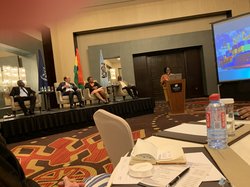
During the first international advisory board meeting on April 2, Nana Oppong, Brenda Chalfin, Andreas Hermansson, and Hans Anders Pedersen provided invaluable suggestions at an early stage of the project. After the official meeting at University of Ghana, Legon, PEPP and the board members visited Tema Port, the Ghana Maritime Authority, and a stakeholder meeting at Kempenski Hotel in connection with the official visit to Ghana of the Secretary-General of IMO, Kitack Lim. Thank you to all participating board members.
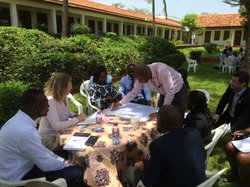
A blast of a stakeholder meeting on April 9, which was very well attended by representatives from a wide variety of public and private Ghanaian, multilateral, and Danish stakeholders, who all engaged in focus group discussions on what was at stake for them in each of the three areas of the project work packages: port efficiency for industrialization, digitalization, and capacity development. PEPP came away with many good ideas and observations for the project. Thank you to all participating stakeholders.
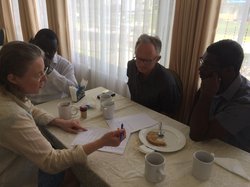
The PEPP team initiated its fieldwork in Ghana from April 3-12, when the team worked out of the Guest House at UG and observed classes at GIFF and RMU, attended a berthing meeting, and interviewed stakeholders from for example MSC, PFC, GIFF, and Ghana cement at Tema Port, and visited national archives and the new MPS terminal construction. Thank you to all for their time and valuable input to the project.